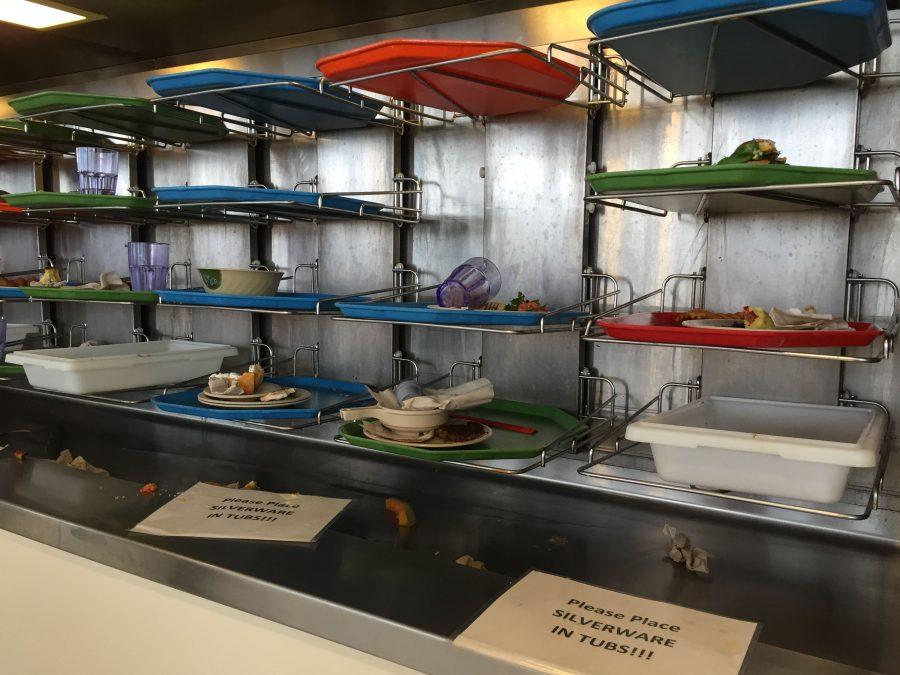Understanding the sourcing of University Dining foods
Students put their food waste, along with their plates and utensils, on a moving tray conveyor belt in the Ikenberry Dinning Hall.
Mar 29, 2017
University Dining produces over 40,000 meals a day. Before those meals can be served, they undergo rigorous safety and nutritional standards.
“When it comes to the variety of sources for our food, we verify that it is food that meets our quality standards and our standards in regards to sustainability,” said Dawn Aubrey, associate director of housing for dining services.
Twenty-eight percent of the food available in the dining halls is produced and sourced locally. Over 40 percent is processed in the state of Illinois.
“We have a much higher percentage of food being processed in the state,” she said. “We are very dedicated to local products, in fact, it is our preference.”
The University also sources products from the sustainable student farm on campus, as well as meat from the meat sciences lab.
Get The Daily Illini in your inbox!
“The produce we get from the student farm also goes through the food fabrication lab in ACES, where it gets processed,” Aubrey said. “In fact, the mushroom burgers we serve are made on campus. The meat sciences lab grinds beef with mushrooms to make the patties.”
Dairy products, including the milk, sour cream, creamer and soft serve ice cream available at the dining halls, come from the raw milk produced on the dairy farm located on campus.
Before Dining procures any products, there is an extensive list of requirements the products must meet.
“We make sure that vendors are following HACCP (Hazardous Analysis Critical Control Points) to ensure that food is handled timely and at the right temperature,” Aubrey said. “We also require GAP (Good Agricultural Practices) certification.”
Biological, chemical and physical hazards in production processes can potentially cause the finished product to be unsafe. The HACCP is a systematic, preventive approach to ensure food safety.
“We also make sure that the vendors are following ethical standards,” she said. “When it comes to the meat we acquire, we ensure that the animals have been handled and harvested correctly and humanely.”
She said the University is dedicated to making sure products are handled in the best way possible.
“We look for food that is not only fresh, but that have the appropriate micronutrients and macronutrients,” Aubrey said. “We want meats that are lean with a low sodium content.”
Macronutrients are energy-giving caloric components that include carbohydrates, fats and proteins. Micronutrients are the vitamins, minerals, trace elements, phytochemicals and antioxidants that are essential for good health.
“The chicken we get is always fresh. It is literally harvested 48 hours before we receive the product,” Aubrey said. “When we buy chicken tenders, we make sure that the chicken tender is a full muscle product and not something that’s been chopped up.”
George Aranda, sophomore in Engineering, said that to him, the dining halls are a facade when it comes to how healthy the meals they produce actually are.
“It’s just fast food trying to look home cooked,” he said.
When it comes to allergens, Dining evaluates everything to make sure that they fully understand what is and isn’t being disclosed on the labels.
“If we find out that there’s something that was not included in the label, we will label it because an individual with a very serious allergy could potentially have a reaction,” Aubrey said.
Annabelle Shaffer, freshman in ACES, said that she would like if the dining halls catered more to students with allergies.
“They need more allergy-friendly options,” Shaffer said. “They also need higher quality fruits and vegetables, and a better way to keep food hot.”
Because food is costly, the University aims to save money through reducing waste. Ways in which they do so include producing food from scratch and in smaller batches, so that the food is not only more fresh, but less of it is wasted.
“By doing so, the food not only ends up tasting better, but costing less too,” Aubrey said.
Any wholesome food products that remain at the end of the day are donated through the Zero Percent program to help with food insecurity in the community.
Zero Percent is a Chicago based organization that partners with businesses and nonprofits to help relieve hunger by donating their leftover food. It was founded by University alumnus, Raj Karmani.
“It’s awesome that the dining halls donate leftover food,” Shaffer said. “It is a great way to prevent food waste and help the surrounding community.”
Shaffer also said that leftover donations benefit the environment by reducing the environmental impacts of the dining system.
“At the end of the day,” Aubrey said, “we are looking for food that is natural, clean and that has as much nutrient density as possible.”






